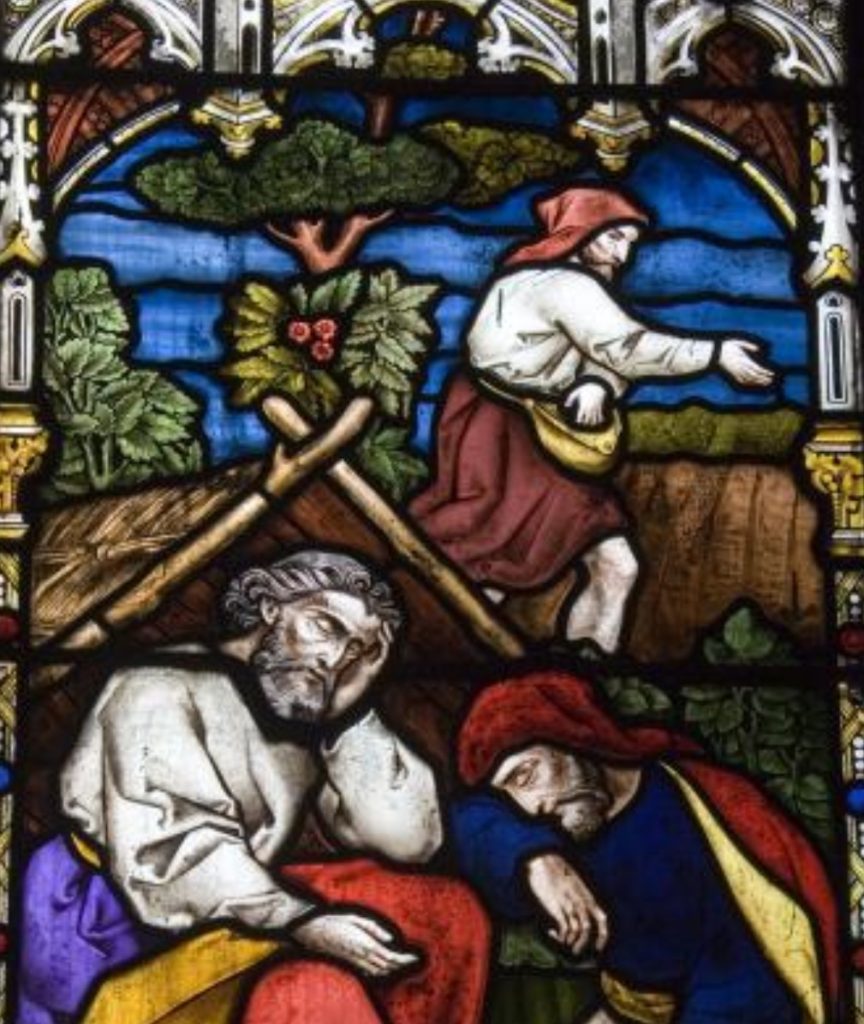DAILY GOSPEL COMMENTARY: ARE WE WHEAT OR WEED?
Mt 13:24-30.

GOSPEL OF SATURDAY, 16TH WEEK IN ORDINARY TIME
Mt 13:24–30
Jesus proposed another parable to the crowds. “The kingdom of heaven may be likened to a man who sowed good seed in his field. While everyone was asleep his enemy came and sowed weeds all through the wheat, and then went off. When the crop grew and bore fruit, the weeds appeared as well. The slaves of the householder came to him and said, ‘Master, did you not sow good seed in your field? Where have the weeds come from?’ He answered, ‘An enemy has done this.’ His slaves said to him, ‘Do you want us to go and pull them up?’ He replied, ‘No, if you pull up the weeds you might uproot the wheat along with them. Let them grow together until harvest; then at harvest time I will say to the harvesters, “First collect the weeds and tie them in bundles for burning; but gather the wheat into my barn.”’”
POPE FRANCIS’ COMMENTARY ON
THE PARABLE OF THE GOOD GRAIN AND THE WEED.

The Enemy Sowing Tares Among the Wheat
Photo © Martin Crampin
ANGELUS
20 July 2014
Dear Brothers and Sisters, Good morning,
These Sundays the liturgy proposes several Gospel parables, that is, short stories which Jesus used to announce the Kingdom of Heaven to the crowds. Among those in today’s Gospel, there is a rather complex one which Jesus explained to the disciples: it is that of the good grain and the weed, which deals with the problem of evil in the world and calls attention to God’s patience (cf. Mt 13:24-30, 36-43). The story takes place in a field where the owner sows grain, but during the night his enemy comes and sows weed, a term which in Hebrew derives from the same root as the name “Satan” and which alludes to the concept of division. We all know that the demon is a “sower of weed”, one who always seeks to sow division between individuals, families, nations and peoples. The servants wanted to uproot the weed immediately, but the field owner stopped them, explaining that: “in gathering the weeds you root up the wheat along with them” (Mt 13:29). Because we all know that a weed, when it grows, looks very much like good grain, and there is the risk of confusing them.
The teaching of the parable is twofold. First of all, it tells that the evil in the world comes not from God but from his enemy, the evil one. It is curious that the evil one goes at night to sow weed, in the dark, in confusion; he goes where there is no light to sow weed. This enemy is astute: he sows evil in the middle of good, thus it is impossible for us men to distinctly separate them; but God, in the end, will be able to do so.
And here we arrive at the second theme: the juxtaposition of the impatience of the servants and the patient waiting of the field owner, who represents God. At times we are in a great hurry to judge, to categorize, to put the good here, the bad there.… But remember the prayer of that self-righteous man: “God, I thank you that I am good, that I am not like other men, malicious” (cf. Lk 18:11-12). God, however, knows how to wait. With patience and mercy he gazes into the “field” of life of every person; he sees much better than we do the filth and the evil, but he also sees the seeds of good and waits with trust for them to grow. God is patient, he knows how to wait. This is so beautiful: our God is a patient father, who always waits for us and waits with his heart in hand to welcome us, to forgive us. He always forgives us if we go to him.
The field owner’s attitude is that of hope grounded in the certainty that evil does not have the first nor the last word. And it is thanks to this patient hope of God that the same weed, which is the malicious heart with so many sins, in the end can become good grain. But be careful: evangelical patience is not indifference to evil; one must not confuse good and evil! In facing weeds in the world the Lord’s disciple is called to imitate the patience of God, to nourish hope with the support of indestructible trust in the final victory of good, that is, of God.
In the end, in fact, evil will be removed and eliminated: at the time of harvest, that is, of judgment, the harvesters will follow the orders of the field owner, separating the weed to burn it (cf. Mt 13:30). On the day of the final harvest, the judge will be Jesus, He who has sown good grain in the world and who himself became the “grain of wheat”, who died and rose. In the end we will all be judged by the same measure with which we have judged: the mercy we have shown to others will also be shown to us. Let us ask Our Lady, our Mother, to help us to grow in patience, in hope and in mercy with all brothers and sisters.
SOURCE: http://w2.vatican.va/content/francesco/en/angelus/2014/documents/papa-francesco_angelus_20140720.html
EMPHASIS MINE.
VIDEO COMMENTARY ON TODAY’S GOSPEL
TOPIC: Are you a wheat or a weed?
People come together for work, for worship, for worthwhile pursuits or other worldly matters. They bring with them their persona and perspectives, shaped by their life experiences. When people of varying backgrounds come together, differences of opinion are bound to exist.
The parable of the wheat and the weeds are very relevant for us who are members of parishes and renewal communities. God’s word is the good seed that has been planted to bring the community into unity of purpose.
But the devil, so cunning and so sly, sows the bad seed of enmity beside the good seed of unity. Each one of us can be made into a weed when we cannot cope and live with the differences of opinion and perspectives that exist in our community.
Our weed-like tendency is to judge others and choke those who are not like-minded to the point of making them quit from the community.
The parable of the wheat and weeds reminds us not to fall into the trap of ostracizing those who do not think like us or agree with us.
A rich man was so dependent on his servant and expected him to arrive early every day to do the household chores and other menial tasks. He was helpless without his servant. On that fateful day, he waited on his servant but after an hour, the servant had not arrived. The rich man was angry and already thinking of the punishments he will mete out on his late servant. Three hours went by and the servant was still missing. He decided that when and if the servant arrived, he will fire him immediately.
The servant finally arrived at noon. The servant came in without speaking to his master and proceeded to prepare lunch for his boss. The fuming master watched in silence as the servant went about doing the household chores. Finally, the master said, “Stop what you are doing. Get out of this house. You are fired!”
The man kept working quietly and diligently. The master repeated himself. “Get out of this house! I said, ‘You are fired!’”
The man said, “Sir, my little girl died this morning.”
We must be careful not to judge people for we do not know what they are going through.
The devil is so cunning that he plants these seeds in each one of us – envy, judgmental behavior, hot-temperedness, domineering attitude, penchant for lies, resentment – and tries to pit us against each other in a group to divide us and destroy the peace and unity that we have.
Taking out the weeds early on may not serve the purpose of God. That is why He allows the weeds to stay on till harvest time. Pulling them out early on will prevent us from the opportunity to bloom where we are placed, to be refined and readied for harvest.
There was this very intelligent teenager who was the absolute headache of his mother. He moved in with a girl while still in his teens and got her pregnant. After 15 years, he dumps her and moves in with another woman. He was very ambitious. He got engaged with her just to advance himself in his career. But after two years, he had a third woman. He left the church his mother had him baptized in and joined a cult. Confused and bored, he eventually left the cult and became a skeptic.
Was he a wheat or a weed? He was a deadly weed. He looks hopeless. He is St. Augustine of Hippo, one of the most important theologians of the Catholic church.
For us who are weeds or know of people who are weeds, we must not despair. God’s grace is just waiting to be asked. In St. Augustine’s case, the incessant prayers of his mother saved him from eternal damnation and turned him into a golden wheat.
Three points we have learned today:
1. We can be weeds if we allow the devil to sow his seeds in us
2. No one is a permanent weed if one let’s God’s grace weed out the sinful tendencies
3. God allows weeds to grow around us to test our resolve to be holy
Stay updated: subscribe by email for free TO OUR NEW WEBSITE www.catholicsstrivingforholiness.org (PUT YOUR EMAIL IN THE SUBSCRIBE WIDGET).
We are also in www.fb.com/Catholicsstrivingforholiness. Kindly help more people in their Christian life by liking our page and inviting your family, friends and relatives to do so as well. Thanks in advance and God bless you and your loved ones! Fr. Rolly Arjonillo
